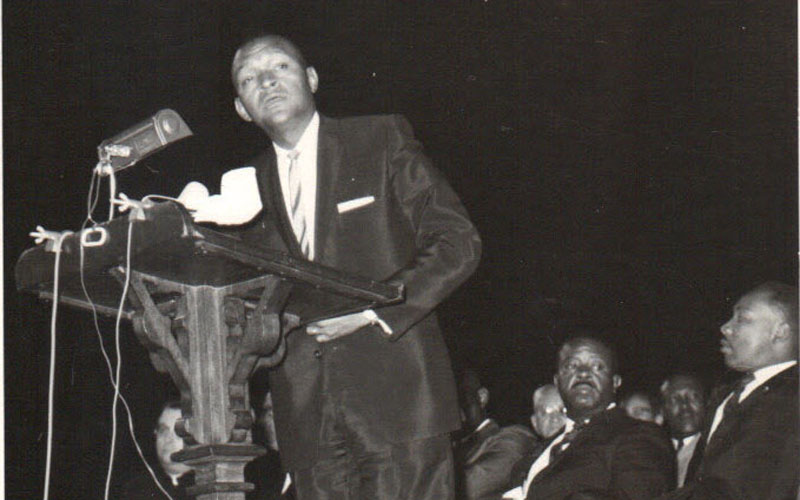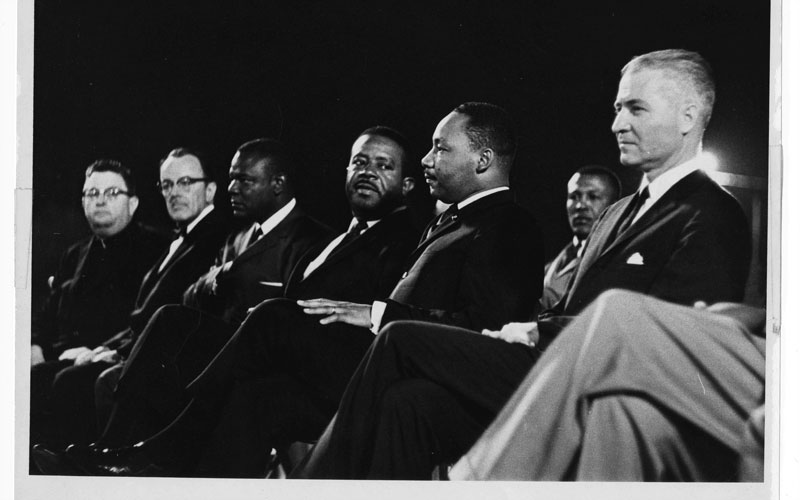
Lincoln Ragsdale at the podium at Goodwin Stadium, Arizona State University on June 3, 1964. Ragsdale’s estate provided an audio recording of King’s ASU speech and remarks earlier in the day at Tanner Chapel A.M.E. Church in Phoenix. (Photo courtesy of ASU Repository)

G. Homer Durham, Martin Luther King, Jr.. Ralph Abernathy, an unidentified participant, Rev. Louis Eaton and Msgr. Robert Donahoe at Goodwin Statium, Arizona State University. King spoke earlier in the day at Tanner Chapel A.M.E. Church (Photo courtesty of ASU Repository)
Historic Tanner Chapel A.M.E. Church, one of the oldest African American churches in the state, is the only Arizona church where civil rights leader Martin Luther King Jr. is known to have given a sermon.

Read more:
Black business struggling to grow in Arizona
Retired master tailor stitched his way through racial boundaries
King spoke for about six minutes on June 3, 1964, saying the battle for racial justice was a “fight to save the soul of America.” His brief remarks came about nine months after his famous “I Have a Dream” speech during the March on Washington.
“People of goodwill all over the nation must come to see racial injustice as wrong and they must not rest until it is removed from every area of our society,” King told the congregants at Tanner.
The Rev. Benjamin Thomas Sr., who has been Tanner pastor since 1991, said the church has long been part of the civil rights movement.
“This is where we met, this is where we organized, this is where we had the focus to move forward and accomplish what we needed to accomplish to impact and improve the lives of people of color,” Thomas said.
Thomas said the church carries the legacy of not only helping African Americans but the entire community.
“In 2001, we organized our Tanner Community (Development) Corporation because we felt there was a need for the church to do so much,” Thomas said.
The organization focuses on outreach programs in economic development, health, housing, education, employment opportunities, youth and family, including a family resource center.
“We believe that as we connect with people in our community, that we’ll all have a better connection with our church and the community,” said Thomas.
Thomas strives to make a difference in the lives of people by showing them how they can better themselves.
“We are about teaching people how to fish and not just giving them fish,” Thomas said.
Dr. Warren Stewart, pastor at First Institutional Baptist Church and a colleague of Thomas, describes him as a conscientious and behind-the-scenes worker.

Martin Luther King Jr. spoke in front of the Tanner AME Church in Phoenix on June 3, 1964 (left). The church still holds services at the same location today (right). Photo by Alexis Dominguez/Cronkite News
“He’s not the kind of leader you see in front of a microphone or on television, but he’s the kind that is behind-the-scenes that makes things happen,” Stewart said.
Thomas works on several nonprofit boards, fights for justice and equality and is a human and civil rights activist, according to Stewart. Thomas is a role model in helping others “without calling attention to yourself,” Stewart said.
“Dr. Thomas is a very humble, modest person who doesn’t seek the spotlight to do what needs to be done to help all of humanity,” said Stewart. “He just does it. If there’s recognition, fine, if there’s not, he’s fine.”
EDITOR’S NOTE: Sources in the Public Insight Network informed the reporting in this story through a partnership with the Cronkite PIN Bureau. To send us a story idea or learn more, click here.